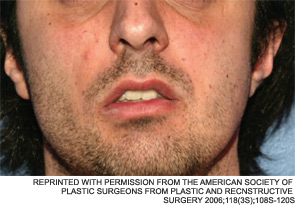Is the transcervical approach indicated in the treatment of Zenker’s diverticulum (ZD) and, if so, to what extent? Background: According to the literature, the only existing curative approach to ZD is […]
Behavioral and Environmental Factors Play Role in Spasmodic Dysphonia
Are specific triggers associated with the onset of spasmodic dysphonia? Background: Spasmodic dysphonia (SD) is an idiopathic voice disorder characterized by a strained, strangled voice quality or a breathy voice with […]
More Research Needed on Gamma Knife Surgery
Is quality of life (QOL) better after surgical removal of vestibular schwannoma or after gamma knife surgery? Background: Gamma knife surgery is becoming an increasingly popular method to manage vestibular schwannoma. […]
The Case for Second Look Procedures
Are there any intraoperative findings that could determine whether a second look procedure should be performed in pediatric cholesteatoma surgery? Background: There is no clear consensus regarding the surgical management of […]
A Blessing and a Curse: Health care reform comes at a steep price
There is a Chinese proverb that is both a blessing and a curse. The blessing is, “May you live in interesting times,” and the curse is, “May you live in interesting times.” All of us would like things to stabilize into a constant, comfortable and predictable environment for us to live our lives, raise our families and care for our patients. We are entering the most complex and challenging period that medicine has experienced since the 1960s when Medicare was introduced. From now on, everything we have come to know and are comfortable with in our professional lives will change.

A Boost for Research: The Triological Society’s grants help physician-scientists launch investigative careers
It can be difficult to launch a career as a physician–scientist, especially when budget cuts are making research funding harder to find—and this is doubly true for a small specialty like otolaryngology. That challenge is the reasoning behind the Triological Society’s grant programs. The society, which has awarded more than $2.5 million in grants since 1994, promotes research into the causes and treatments of ear, nose and throat diseases.

Personalized Care: Study highlights which patients would benefit from a second round of chemoradiation
Balancing the risks and benefits of concurrent reirradiation and chemotherapy for recurrent head and neck cancers is difficult for physicians at even the most experienced centers. Research recently published in Cancer, however, suggests that selection of patients who may benefit from this therapy should be based on the patient’s previous treatment and the amount of time that has elapsed since initial treatment…

Repair Revolution: Surgeons use fat grafts to address extensive facial deformities
Fat grafts have been used to repair the aging face for about two decades, but recently, surgeons have been using grafts to repair more extensive facial deformities caused by injury, illness or congenital abnormalities. Success, they said in interviews with ENT Today, depends on proper patient selection, matching the fat graft to defects that are most amenable to repair with fat injections and an understanding of the biology of the graft and how it reacts with surrounding facial structures.

Rent the Right Way: Medical offices require unique leases
As tenants of medical office spaces, physicians often create special leasing issues. Medical tenants use hazardous materials, generate biomedical waste, demand confidentiality of patient records and require compliance with occupational safety standards—all unique aspects of the medical profession. Yet, often, physicians will sign “form” medical office lease agreements provided by the landlord without the benefit of legal counsel. Typically, the landlord provides a standard fill-in-the-blank lease form with the tenant’s name and the general business terms (including the term of lease, rental rate and commencement date). Tenants may gloss over the legal boilerplate provisions included in the lease agreement, assuming that these terms are standard to all leases and are not subject to negotiation.
New Speech-Language Pathology Rule: Supervision of videostroboscopy and nasopharyngoscopy no longer required
Medicare requirements for physician supervision of speech-language pathologists conducting videostroboscopy (CPT 31579) and nasopharyngoscopy (CPT 92511) will move from the strictest level of oversight back to no national supervision level starting in October.
- « Previous Page
- 1
- …
- 257
- 258
- 259
- 260
- 261
- …
- 328
- Next Page »